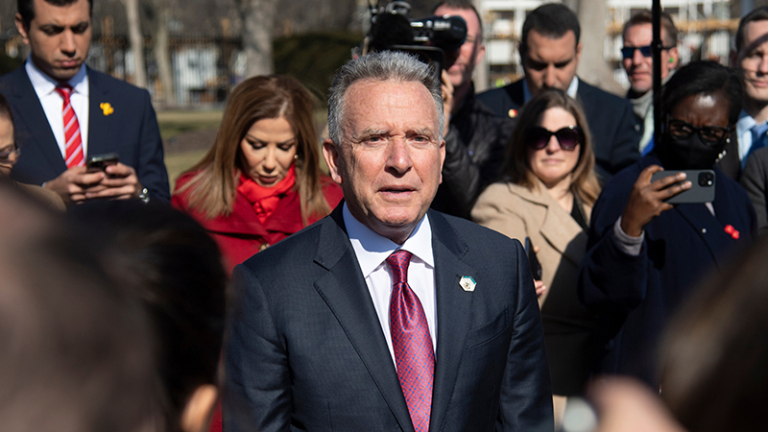
On July 25, 2025, the United States and Israel announced that they were cutting short Gaza ceasefire talks with Hamas and recalling their negotiating teams from Qatar for consultation. The United States blamed the decision on Hamas, which President Donald Trump’s Special Envoy to the Middle East, Steven Witkoff, said was not “acting in good faith.” The deal reportedly under consideration involved an initial 60-day ceasefire and the exchange of Palestinian prisoners and Israeli hostages between the two sides, followed by an increase in the level of humanitarian aid that Israel allows to enter Gaza. After these steps, talks on lasting ceasefire would begin. Although Hamas’s response to this proposal has not been made public, its leadership has consistently pushed for a full Israel withdrawal from Gaza and for an end to the conflict, rather than for a solution in phases. With the talks paused for now, if not indefinitely, a diplomatic resolution to the Gaza war seems as far away as ever.
Despite Israel’s July 27, 2025, announcement of a military pause in some parts of Gaza, a move that it claimed would facilitate the delivery of aid, the humanitarian situation remains dire. At a July 28 press conference in Scotland with British Prime Minister Keir Starmer, President Trump said that a ceasefire deal was still possible and acknowledged the critical need for food in Gaza because, as he said, “you have a lot of starving people.” Israeli rights organizations B’Tselem and Physicians for Human Rights-Israel have for the first time warned of a “genocidal regime in Israel, working to destroy Palestinian society in Gaza.” In this changing diplomatic and political context, does a ceasefire in Gaza even remain in the realm of possibility?
Arab Center Washington DC (ACW) asked its analysts and fellows to provide brief commentaries to discuss the current hiatus in negotiations and the outlook for Gaza. Their perspectives are below.
Why a Ceasefire Is Crucial
Yara M. Asi, Non-resident Fellow
By now, we have all seen the horrific images and videos from Gaza showing near-skeletal babies, children with amputated limbs, families screaming in desperation as they search the remnants of their destroyed homes for any signs of life. We have all heard the desperate pleas from humanitarian agencies, the growing chorus of experts recognizing Israel’s actions and motives as genocidal, and the dehumanizing rhetoric from Israeli politicians that explicitly calls for ethnic cleansing and territorial expansion in Gaza.
Yet, despite two temporary ceasefires amid seemingly endless “ceasefire talks,” Israel’s campaign of deprivation and slaughter continues unabated. The Ministry of Health in Gaza has confirmed more than 60,000 deaths, but epidemiologists and other experts estimate that the true death toll may surpass 100,000. Tens of thousands of people have had life-altering injuries; almost everyone in Gaza has been displaced, some multiple times. Testimonies reveal almost unimaginable tragedy, a growing sense of hopelessness, and worse: the understanding that the world has written them off.
After all they have endured, the people of Gaza deserve justice. History has shown that this goal may be difficult to achieve but ultimately it is necessary. Today, however, Gazans deserve an end to the bombing, the evacuation orders, and the terror. They need a ceasefire. In recent weeks, at least 100 Palestinians have died from starvation, and hundreds more have been shot and killed trying to get aid. What suffering could be more compelling to necessitate an immediate end to this genocide? Without demanding an immediate ceasefire and subjecting Israel to appropriate legal action, the international community is signaling that, despite their condemnations and concerns, they consent to the mass killings and thus are complicit in every violation of international law.
Netanyahu’s and Trump’s Political Expediency on Gaza
Daniel Brumberg, Non-resident Senior Fellow
Israeli Prime Minister Benjamin Netanyahu stated in a rare press conference on May 22, 2025, that while he was“ ready to end the war,” he would agree to do so only under the following conditions: “All the hostages come home, Hamas lays down its arms, steps down from power, its leadership is exiled from the Strip…Gaza is totally disarmed; and we carry out the Trump plan. A plan that is so correct and so revolutionary.”
There is no reason not to take Netanyahu at his word. He has made it clear that President Donald Trump’s proposal to “relocate” Palestinians from the Strip will be part of any solution to the Gaza war. This is classic Netanyahu: calculating, ruthless, and self-serving, since the pursuit of what he would call total victory in Gaza will help keep him in office.
As for Trump, he is calculating and ruthless in his own way, but also impulsive and unpredictable. His foreign policy is far more about exercising personal power and domination than about pursuing any coherent strategy or even tactic. While Trump has enabled Netanyahu’s military campaign in Gaza—and the US president shows no inclination to push the Israeli prime minister to reach a ceasefire—he could pivot if, and when, he concludes that the continuing humanitarian catastrophe in Gaza is seen as his personal failure to control the situation.
Israel’s Calculations and Policy Objectives
Khalil E. Jahshan, Executive Director
The Islamic Resistance Movement (Hamas) has hesitated to accept repeated attempts by Washington and Tel Aviv to dictate the outcome of the Gaza ceasefire talks underway in Qatar since December 2023. Visibly frustrated with the lack of a deal, the US administration announced on July 24, 2025, that it was “cutting short” its participation in the talks. The United States apparently has been unable to secure a diplomatic breakthrough that would see an exchange of Israeli hostages and Palestinian prisoners, followed by an end to the relentless 22 months of fighting in Gaza.
Like the Netanyahu government, US Special Envoy Steven Witkoff blamed the talks’ halt on what he called Hamas’s selfish, irresolute responses. He threatened that the US administration would now “consider alternative options to bring the hostages home and try to create a more stable environment for the people of Gaza.” Ironically, Hamas was the only stakeholder to insist that the talks would not be allowed to implode and that all parties remain invested in a diplomatic deal, as outlined by senior Hamas political figure Ghazi Hamad.
Do these synchronized pronouncements by the United States and Israel signify the demise of Qatari-Egyptian mediation with Hamas? Or do they simply represent additional pressure on Hamas to accept the proposal recently tabled at the Doha talks?
It is possible that the talks, which have unfolded over a fitful two years, have definitively ended. But it is also possible that the parties have not yet reached the breaking point. Israel is clearly conflicted about the ceasefire negotiations. Indeed, very few Israelis—with the exception of some opposition figures and the hostages’ families—would shed a tear at their demise. Militating against a total withdrawal from the talks, however, are Israel’s internal political differences, as well as Machiavellian attempts by Netanyahu himself to salvage his political career and avoid a jail sentence for corruption and bribery charges.
Instead, the Israeli government is likely to continue to impede the negotiations, to create facts on the ground in Gaza and the West Bank, and to blame Hamas for undermining the diplomatic process. After all, Israel still faces the domestic and external implications of its failure to achieve its dual strategy in Gaza: to release the hostages and to eradicate Hamas militarily and politically. At this juncture, buying time is of the essence to Netanyahu.
The Hamas Position Remains the Same
Yousef Munayyer, Head of Palestine/Israel Program
Despite hopeful-sounding comments from President Trump about a ceasefire deal in Gaza, the American and Israeli negotiating teams pulled out of the talks after rejecting Hamas’s response to the latest proposal from the United States, Qatar, and Egypt for a 60-day truce. Hamas’s position has been consistent from the outset of the talks. Hamas has long been prepared to release all Israeli captives in exchange for Israel’s release of Palestinian prisoners held in Israel and Israel’s ending of the war.
This position has never been acceptable to Netanyahu and his hard-right allies, however, for two reasons. First, kingmakers in Netanyahu’s coalition have ideological designs on Gaza that require expelling its residents, annexing the territory, and building Jewish-only colonies there. Second, an end to the war would bring about a political turning of the page in Israel that would threaten Netanyahu’s premiership and potentially hold him accountable for the greatest security failure in Israeli history that allowed the Hamas attack on October 7, 2023. Should his government fall, Netanyahu would also be more vulnerable to the multiple corruption charges that have dogged him for the last decade.
Hamas has continued to show flexibility on a wide range of issues, including on its role in a post-genocide Gaza, but it remains most committed to a deal that ends the war permanently. Israel refuses to publicly commit to such a deal, although private guarantees by the United States may be able to bridge this gap. But the Palestinian side has little faith in American guarantees, especially since Israel already backed out of a ceasefire agreement in March 2025 without suffering any repercussions from the United States. For these reasons, Hamas is likely gauging Israel’s intentions during a truce by the field positions to which the Israeli military is willing to retreat as part of any ceasefire deal. What the Israeli government has been willing to accept thus far has clearly signaled to Hamas that Netanyahu’s intentions are not to end the fighting, but to continue the war as soon as the first exchanges of captives have taken place.
Will a Ceasefire Halt Israel’s Expulsion of Palestinians in Gaza?
Assal Rad, Non-resident Fellow
A ceasefire would offer Gazans desperately needed relief from Israel’s relentless bombardment and potentially would open the door for humanitarian aid to a starving, besieged population. A temporary pause would save lives in the short term but would be unlikely to prevent Israel from reaching its ultimate objectives: the ethnic cleansing and full conquest of Gaza.
The term ‘ethnic cleansing’ is a euphemism for genocide. Israel’s systematic destruction of Gaza’s infrastructure, collapse of its healthcare system, starvation of its population, and daily killing of civilians all serve one purpose. By design, Israel has rendered Gaza uninhabitable in order to forcibly displace Palestinians. The physical destruction of an entire people is genocide, in both effect and intent.
In this context, ceasefire talks serve as a smokescreen. Talks allow Israel to appear diplomatic and to be acting in good faith while continuing its long-standing strategy of dispossession. Just as the so-called peace process brought only more illegal settlements and violent repression over previous decades, so too do current negotiations risk repeating the same cycle of deception.
Israeli leaders have not concealed their true aims. Netanyahu has boasted about thwarting Palestinian statehood for decades, long before October 7 and the current genocide in Gaza. Israeli media have reported that Netanyahu has reassured his coalition that Israel will not end the war and that Israel’s destruction of homes would continue, in order to force Palestinians to leave the Strip. In 2024, Minister of National Security Itamar Ben-Gvir joined Israeli settlers at a conference that openly called for expelling Palestinians and populating Gaza with Israeli settlers. Last week, Israeli military leaders and Minister of Finance Bezalel Smotrich discussed plans to annex Gaza, while Minister of Heritage Amichay Eliyahu stated that Israel is racing to wipe out Palestinians in Gaza and make the territory Jewish.
This is not a rogue policy: it is the agenda of Israel’s highest leadership. A ceasefire is necessary and urgent humanitarian intervention is vital. But without international accountability or meaningful consequences for Israel’s actions, a ceasefire alone will not stop the military expulsion of Palestinians from Gaza. Only global pressure and justice can halt the ongoing catastrophe.
Is the Trump Administration Sincere in Wanting a Ceasefire in Gaza?
Annelle Sheline, Non-resident Senior Fellow
The Trump administration knows how to achieve a ceasefire in Gaza, because Trump already bullied Netanyahu into accepting one in time for his return to the White House in January 2025. Trump allegedly warned Netanyahu that the United States might withhold security assistance if Israel did not temporarily end its assault on Gaza. Trump was willing to play this card to demonstrate his superiority over his predecessor Joe Biden by delivering a result that the Biden administration had failed to achieve.
The Trump administration’s inability to reach another ceasefire reveals that it is no longer willing to exert that leverage. Instead, it has adopted the Biden administration’s posture of feigned helplessness. If Trump wanted a ceasefire, a single phone call to Netanyahu would produce one; historically, such phone calls by US presidents have reined in the Israeli military’s excessive violence. Apparently, Israeli officials had expected a similar call from Biden by Christmas 2023, yet that call never came. Biden’s inability to stop Gaza later contributed to the Democratic Party’s defeat, and Trump’s victory, in the 2024 presidential election.
As Netanyahu knows, the era of unconditional, bipartisan support for Israel in the United States is drawing to a close. Both Democrats and Republicans increasingly question the vast amounts of wealth and weapons that the United States pours into Israel, with no apparent benefit to Americans. This major public opinion shift has given Netanyahu an incentive to grab as much territory and end as many Palestinian lives as he can while he still has friends in the White House and Congress. Trump will only become sincere in wanting a ceasefire if his base demonstrates that—like the Democratic voters who refused to turn out for 2024 Democratic presidential candidate Kamala Harris—supporting starvation and genocide are not good ways to spend billions of US tax dollars.
The views expressed in this publication are the author’s own and do not necessarily reflect the position of Arab Center Washington DC, its staff, or its Board of Directors.
Featured image credit: Shutterstock/Noam Galai






